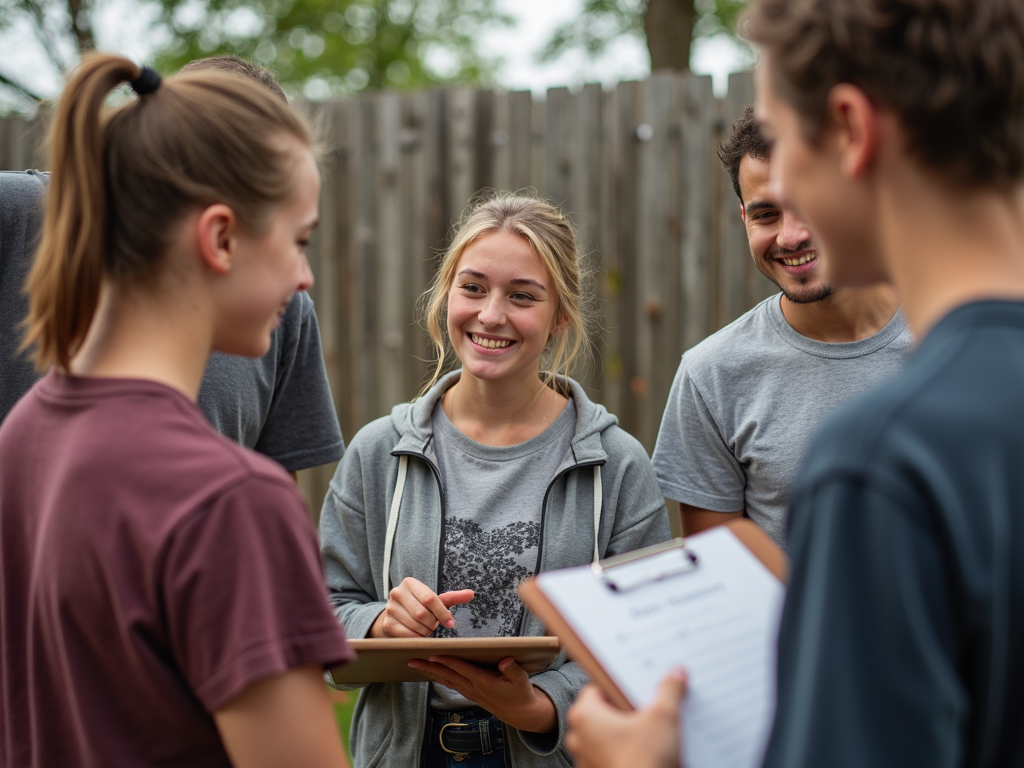Leadership Lessons from Real Teens: Building Skills Through Community Involvement
By , July 6, 2025
Overview:
Discover how real teens are learning valuable leadership lessons through community involvement. This article explores the impact of youth advocacy and volunteer projects on developing essential leadership skills.
Introduction to Teen Leadership:
Leadership is often associated with adults in positions of authority, but teens can also be powerful leaders. Community involvement provides a unique platform for teens to develop and demonstrate leadership skills. Through volunteer projects, advocacy, and community service, teens can make a tangible impact while learning valuable lessons in leadership.
Personal Story:
When I was 16, I volunteered at a local animal shelter. Initially, my tasks were simple: cleaning cages and feeding the animals. However, I noticed that the shelter struggled with funding and public awareness. I decided to take the initiative and organize a fundraising event. I rallied my friends, created flyers, and reached out to local businesses for donations. The event was a success, raising significant funds and increasing community engagement with the shelter. This experience taught me the importance of planning, communication, and teamwork—key components of leadership.

Building Leadership Skills Through Community Involvement:
Community involvement is a fertile ground for leadership development. Here are some ways teens can build leadership skills through such activities:
- Taking Initiative: Identifying community needs and taking the lead in addressing them. For example, organizing a neighborhood cleanup or starting a recycling program.
- Problem-Solving: Volunteer projects often present challenges, such as limited resources or logistical issues. Teens learn to think creatively and find solutions.
- Communication: Effective communication is crucial in coordinating efforts, rallying support, and conveying messages. Teens can practice public speaking, writing, and interpersonal communication.
- Teamwork: Working with others towards a common goal fosters collaboration. Teens learn to delegate tasks, motivate team members, and resolve conflicts.
Case Study:
In a small town, a group of teens noticed that their local park was in disrepair. They decided to take action. They organized a cleanup day, mobilized volunteers through social media, and even secured donations from local businesses for new playground equipment. The project not only improved the park but also showcased the teens' leadership capabilities. They learned to plan, execute, and evaluate a project, all while inspiring their community.

The Value of Community Involvement for Teens:
Community involvement is invaluable for teens. It helps them develop a sense of responsibility, empathy, and civic engagement. By participating in volunteer projects and advocacy, teens learn the importance of giving back and making a positive impact. These experiences also boost their confidence and self-esteem, as they see the tangible results of their efforts.
Youth Advocacy and Volunteer Projects:
Youth advocacy and volunteer projects are particularly powerful for leadership development. These initiatives allow teens to voice their opinions, champion causes they care about, and effect change. For instance, teens can advocate for environmental sustainability by organizing awareness campaigns or volunteer at homeless shelters to support those in need. These experiences shape teens into confident, compassionate leaders.
Expert Insight:
Dr. Jane Smith, a renowned psychologist specializing in adolescent development, states, "Community involvement provides teens with real-world experiences that are crucial for leadership development. It helps them build confidence, resilience, and a sense of purpose. These skills are transferable to various aspects of their lives, including academics and future careers."

Challenges and Overcoming Them:
While community involvement offers many benefits, it also presents challenges. Teens may face obstacles such as lack of resources, resistance from others, or balancing commitments with school and other activities. However, overcoming these challenges is part of the leadership journey. It teaches resilience, adaptability, and perseverance.
Tips for Teens:
Here are some tips for teens looking to get involved in community projects:
- Start Small: Begin with manageable projects, such as organizing a small event or joining an existing initiative. Gradually take on more responsibility as you gain experience.
- Seek Mentorship: Find mentors who can guide and support you. Mentors can provide valuable advice, resources, and encouragement.
- Collaborate: Work with others to achieve common goals. Collaboration fosters creativity and shared success.
- Reflect: Take time to reflect on your experiences. What did you learn? What could you improve? Reflection helps you grow as a leader.

Real-Life Examples:
Let's look at some real-life examples of teens who have demonstrated exceptional leadership through community involvement.
- Alex Scott: At the age of 4, Alex was diagnosed with cancer. Despite her illness, she started a lemonade stand to raise money for cancer research. Her initiative grew into Alex's Lemonade Stand Foundation, which has raised millions for pediatric cancer research.
- Malala Yousafzai: Malala advocated for girls' education in Pakistan, even after surviving an assassination attempt. She became the youngest Nobel Prize laureate and continues to inspire youth worldwide.
- Greta Thunberg: Greta started a solo protest against climate change, which sparked a global movement. Her leadership has brought attention to environmental issues and mobilized millions.
These examples show that teens can make a significant impact and lead change, regardless of their age.

Conclusion:
In conclusion, leadership lessons from real teens highlight the transformative power of community involvement. By engaging in volunteer projects and advocacy, teens not only contribute to their communities but also develop essential leadership skills such as initiative, problem-solving, communication, and teamwork. These experiences lay the foundation for future success and inspire others to follow suit. As teens take on leadership roles, they become agents of change, shaping a better future for themselves and their communities.